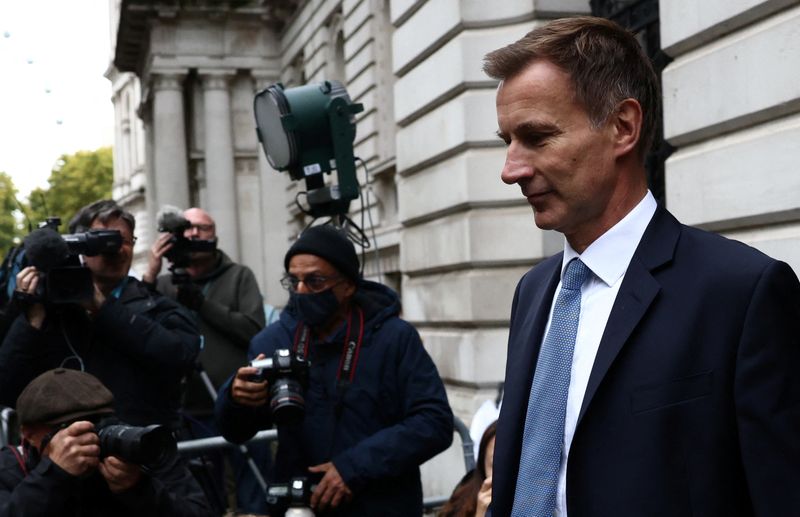By Geoffrey Smith
Investing.com -- U.K. markets were mixed on Monday after the government flagged its intention to raise taxes and cut public spending when it announces its budget for the next year on Thursday.
Chancellor of the Exchequer Jeremy Hunt had said in TV interviews at the weekend with the BBC that "We are going to see everyone paying more tax. We're going to see spending cuts," as part of a strategy that will focus first and foremost on bringing down inflation.
The size and structure of those measures are still uncertain, and a variety of conflicting numbers were still circulating on Monday. The Financial Times said the Office for Budget Responsibility had warned of a £70 billion hole in public finances needing to be closed. It said this was primarily the result of higher debt servicing costs caused by the turmoil unleashed by former Prime Minister Liz Truss's ill-fated tax cut proposals. These have now been scrapped by Truss's successor, Rishi Sunak.
Various reports have suggested that Hunt will try to close the funding gap with around £55B worth of tax and spending measures, which are likely to include steps to freeze tax thresholds at current levels, rather than letting them rise roughly in line with inflation as is usual. Departmental spending is also likely to be frozen in many areas, something that promises further unrest among public-sector workers going forward. The U.K.'s Royal College of Nursing, which represents nurses across the U.K.'s sprawling National Health System, voted last week for the first time in history to strike for higher pay.
The FT also reported that the measures will include a halving of the annual tax-free allowance on capital gains from £12.300 currently.
Bloomberg, which also carried the £55B number, said tax measures will probably account for around 40% of the total, with spending cuts accounting for the other 60%.
A tightening of fiscal policy has come to be seen as inevitable after years of extraordinary measures - funded by borrowing - to support the economy through both the pandemic and a period of lower growth due to the U.K.'s departure from the European Union, which has hurt its external trade.
Tony Danker, head of the Confederation of British Industry, told the FT that the government is still too "fixated about repealing EU law and not about what is restricting growth."
Hunt's comments were taken with a degree of apathetic resignation by U.K. markets on Monday morning.
By 04:00 ET, (09:00 GMT), the pound was down 0.1% at $1.1809 and was flat against the euro at €1.1444. The U.K.-focused midcap index FTSE 250 was down 0.4% and the benchmark 10-Year Gilt yield, having risen at the open in response to the OBR's reported forecasts, was unchanged at 3.36%. It had peaked at over 4.60% in October on concern at Truss's plans.
